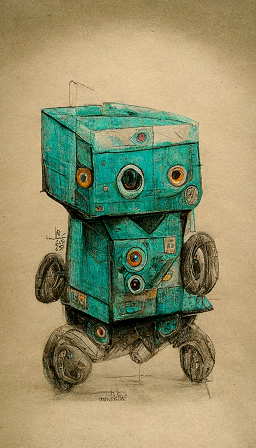AI at Work, for Better or Worse

As you surely know if you are a denizen of the online world like I am, artificial intelligence has made remarkable strides in the past few years. In particular, what they are calling generative AI has really taken off. This is a kind of advanced pattern matching software that grew out of machine learning. It lets you use prompts to create content like images, complicated text including writing stories, and even videos and music at this point. At the bottom of this post I linked to a YouTube video that explains generative AI really well so check it out.
I played with AI image generators for a while, and had some fun. In their early iterations they produced really weird, often creepy looking stuff, but now they’ve gotten pretty advanced. The images they produce are intriguing, impressive even. I saved a lot of the ones I generated, but stopped messing with the programs when I saw how many of my artist friends were upset by the proliferation of AI-generated images on social media. I gathered they could sense their own work being made obsolete by an overwhelming supply of easily produced knock-off art. Why hire an illustrator when you can just describe what you want into a text box in an AI tool, and get the result in a few minutes? Plus there’s the troubling issue of these programs possibly being trained on copyrighted material without the consent of the copyright owners, meaning they are effectively stealing from artists.
Another thing you have to consider about the product of generative AI (and this is covered in the video below) is that it is subject to one of the rules about computer programming that I was taught as a lad: Garbage In, Garbage Out. That is, if you put bad data into a computer program, then you will get bad data out of it. Generative AI is trained on massive data sets, and one result of the way the current AI programs have been trained is that they produce content that tends to express a sort of lowest common denominator of its subject matter. You put in the vast quantity of data on the Internet, apply sophisticated pattern matching, and you get out, as a result, something like an “Internet average” version of human knowledge.
For an example of what I mean, here is a fantastic article explaining how AI-generated images of selfies misrepresent culture. They do this because the pattern matching algorithms take the conventional way that selfies typically look and apply it to subjects where that wouldn’t make sense. So an AI-generated image of, say, a group selfie of medieval warriors makes them look like modern day humans. Now, since the idea of the existence of such a selfie is absurd on the face of it, maybe it’s pointless to worry about its inherent historical inaccuracy. But in a way, these kinds of images are erasing history.
The article goes even deeper; the AI generators tend to represent everyone as smiling into the camera the way that Americans do. But other cultures that do exist today and do take group selfies have different ways of expressing themselves when taking photos. So the AI programs aren’t just erasing history, they are also erasing existing modern cultures. They are turning everyone into Americans, because American culture dominates the Internet.
Here’s another way AI-generated content gravitates toward a dominant average mode, one you might have heard of already. It seems that AI chat programs, trained on the massive data of online conversations, will often produce racist, abusive comments. It’s like they inevitably turn into Internet trolls. This might seem like a mere annoyance, but AI programs generating racially biased content can have serious, life or death consequences.
With all of these concerns, it’s understandable that public perception of AI is not always favorable. Ted Gioia (who has an awesome substack, by the way) wrote about this perception recently, starting with a story about the audience at SXSW booing an AI presentation. His article expands into a general discussion of the public’s current distrust of the technocracy, in contrast with the way technocrats like Steve Jobs were idolized in the past. Faith in “innovation” and “disruption” has waned in a society facing uncertainty and disorder, and sensing that technology is leading us toward a dystopian future.
Where does AI fit into my life, now that I’ve stopped playing with image generators? Well, I may not be able to avoid using it, as the company where I work has been promoting AI chat programs to help with day to day tasks. We are all being asked to look into them and come up with ways this new software can improve our productivity. Other folks who have a job like mine might be encountering similar pushes at their workplaces.
I think this is an honest effort by our management to ensure that our organization doesn’t get left behind in the AI wave they are convinced will revolutionize the workforce. Stay ahead of the disruption, and ride the wave I guess is the thinking. Surely it’s not the case, as Aileen and I joked when I brought this up to her, that I am training an AI to replace me. I mean, why pay a software tester when you can just describe the tests you need into a text box in an AI tool? Oh my.
Below is the very informative video that explains Generative AI.